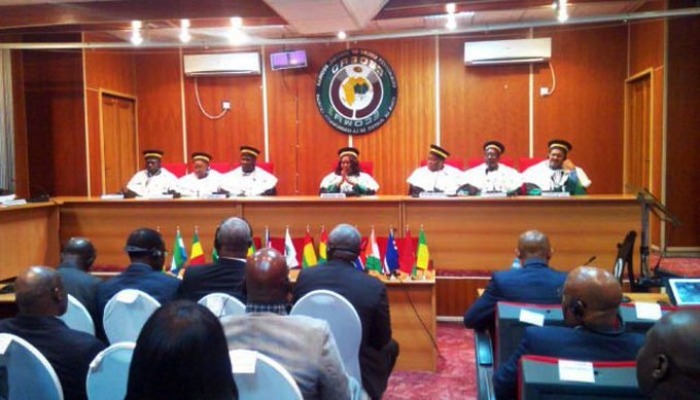***Orders FG to cease from using code until it aligns with IHR obligations
By Harry Awurumibe, Editor, Abuja Bureau
The Economic Community of West African States (ECOWAS) Court on Monday, October 23, 2023 in a judgment delivered in a suit filed by an NGO- Expression Now Human Rights Initiative against the Federal Republic of Nigeria, held that Nigerian government has failed in its responsibility to align its domestic legislation with its international obligations under [p.31, para.65].
According to a press statement made available to Prompt News by Barrister Solomon Okedara, Counsel to the petitioners, the Applicant had challenged the use of the Nigerian Broadcasting Code by the Nigerian government to arbitrarily impose sanctions including fines against broadcast stations.
The court observed that in enacting laws “member states must give due consideration to its alignment with international guarantees and obligations like those under the ACHPR”[p.22, para. 49].
To consider whether a local enactment is in compliance with provisions of Article 9 of the ACHPR that protects freedom of expression, such a piece of legislation will be assessed against Declaration on the Principles of Freedom of Expression and Access to Information in Africa (adopted in 2019 at the 65 th Ordinary Session of the African Commission on Human Rights).
The Applicant specifically challenged Articles 3 (1) (1), 3(1) (2), 15(2) (1) of the Nigeria Broadcasting Code (6th Edition) and Article 15 (5) (1) of the Amendments to the Nigeria Broadcasting Code (6th Edition) that they contravene principle of freedom of expression.
In its judgment, the court noted that Article 3(1) (1) of the Code is infinite in scope and therefore violate provision of Article 9(1) and (2) of the African Charter on Human and People’s Rights (ACHPR). The court noted that the provisions of Article 3(1) (2) of the Code is too ambiguous and vague and it can “lead to curtailment of the right to freedom of expression” [p.24, para.51]. The court concluded that Articles 3 (1) (1) and 3(1) (2) with their vaguely worded provisions and Articles 15(2) (1) and Article 15 (5) (1) of the Amendments to the Nigeria Broadcasting Code (6th Edition) that provide for penalties “cannot be seen to have been enacted in the spirit of promotion or protection of the right to freedom of expression, reason being that the sanctions resulting will be arbitrary and the scope will be infinite” [p.24,para.52].
Finally, the court declared that Articles 3 (1) (1), 3(1) (2), 15(2) (1) of the Nigeria Broadcasting Code (6th Edition) and Article 15 (5) (1) of the Amendments to the Nigeria Broadcasting Code (6th Edition) contravenes Article 9(1 & (2) of the ACHPR.[p.32]. The court also answered in the affirmative and re-emphasizes that the fines imposed under Article 15(5(1) of the Amendments to the NBC (6 th Edition), in furtherance of implementation of Articles 3(1)(1), 3(1)(2) of the NBC are in violation of Article 9 of the ACHPR. [p.30., para.64].
The court ordered that the Nigerian government led by President Bola Ahmed Tinubu align Articles 3 (1) (1), 3(1) (2), 15(2) (1) of the Nigeria Broadcasting Code (6th Edition) and Article 15 (5) (1) of the Amendments to the Nigeria Broadcasting Code (6th Edition) in line with its obligations under Article 1 of the ACHPR and to cease giving effect to the provisions until it has aligned same as ordered [p.32]. READ ALSO:
- President Federation Cup: State Competitions Get Underway
- Simon Named In Ligue 1 Team Of The Week
- Olopade hails Nigerian cricket team for defeating New Zealand at ICC U19
- Sanwo-Olu hosts new Lagos Speaker Meranda, promises cooperation
- Father of arrested gospel singer pleads for son’s release
In a bid to ensure compliance with the orders of the court given in the judgment, the court further ordered that the Nigerian government “submit to the court within six (6) months of the date of notification of this judgment, a report on the measures taken to implement the orders set-forth herein” [p.32]. The court also awarded costs against Nigerian government to be calculated by the Chief Registrar of the court.
Counsel to the Applicant in the suit, Solomon Okedara lauded the well-considered judgment and described it as marking the new dawn of media freedom in Nigeria and the rest of the ECOWAS region, particularly, at a time when media freedom is under severe attacks in most emerging democracies around the world.
Okedara stressed that journalists and media houses should be free to do their jobs without fear of sanctions including fines and revocation of broadcasting licenses.


